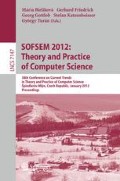Abstract
Various methods exists in the litearture for denoting the configuration of a Turing Machine. A key difference is whether the head position is indicated by some integer (mathematical representation) or is specified by writing the machine state next to the scanned tape symbol (intrinsic representation).
From a mathematical perspective this will make no difference. However, since Turing Machines are primarily used for proving undecidability and/or hardness results these representations do matter. Based on a number of applications we show that the intrinsic representation should be preferred.
Access this chapter
Tax calculation will be finalised at checkout
Purchases are for personal use only
Preview
Unable to display preview. Download preview PDF.
References
Chandra, A.K., Kozen, D.C., Stockmeyer, L.J.: Alternation. J. Assoc. Comput. Mach. 28, 114–133 (1981)
Cook, S.A.: The complexity of theorem proving procedures. In: Proc. ACM Symposium Theory of Computing, vol. 3, pp. 151–158 (1971)
Chlebus, B.G.: Domino-tiling games. J. Comput. Syst. Sci. 32, 374–392 (1986)
Garey, M., Johnson, D.: Computers and Intractability: A Guide to the Theory of NP-Completeness. W. H. Freeman and Co. (1979)
Hartmanis, J., Simon, J.: On the power of multiplication in random access machines. Proc. IEEE Switching and Automata Theory 15, 13–23 (1974)
Hennie, F.C., Stearns, R.E.: Two-way simulation of multi-tape Turing machines. J. Assoc. Comput. Mach. 13, 533–546 (1966)
Immerman, N.: Nondeterministic space is closed under complementation. SIAM J. Comput. 17, 935–938 (1988)
Jones, J.P., Matijasevič, Y.V.: Register machine proof of the theorem on exponential Diophantine representation of enumerable sets. J. Symb. Logic 49, 818–829 (1984)
Kleene, S.C.: Introduction to Metamathematics. Noth Holland Publ. Cie (1952)
Levin, L.A.: Universal’nie zadachi perebora. Problemi Peredachi Informatsie IX, 115–116 (1973) (in Russian)
Lewis, H.R.: Complexity of solvable cases of the decision problem for the predicate calculus. In: Proc. IEEE FOCS, vol. 19, pp. 35–47 (1978)
Lewis, H.R., Papadimitriou, C.H.: Elements of the Theory of Computation. Prentice-Hall (1981)
Pratt, V.R., Stockmeyer, L.J.: A characterization of the power of vector machines. J. Comput. Syst. Sci. 12, 198–221 (1976)
Savelsberg, M.P.W., van Emde Boas, P.: BOUNDED TILING, an alternative to SATISFIABILITY? In: Wechsung, G. (ed.) Proc. 2nd Frege Memorial Conference, Schwerin. Mathematische Forschung, vol. 20, pp. 401–407. Akademie Verlag (September 1984)
Savitch, W.J.: Relations between Deterministic and Nondeterministic tape Complexities. J Comput. Syst. Sci. 12, 177–192 (1970)
Slisenko, A.O.: A simplified proof of the real-time recognizability of palindromes on Turing Machines. J. Mathematical Sciences 5(1), 68–77 (1981)
Spaan, E., Torenvliet, L., van Emde Boas, P.: Nondeterminism, fairness and a fundamental analogy. EATCS Bulletin 37, 186–193 (1989)
Stockmeyer, L.J., Meyer, A.R.: Word problems requiring exponential time. In: Proc. ACM STOC, vol. 5, pp. 1–9 (1973)
Stockmeyer, L.: The complexity of decision problems in automata theory and logic, Report MAC-TR-133, MIT (1974)
Szelepsényi, R.: The method of forcing for nondeterministic automata. Bull. EATCS 33, 96–100 (1987)
Turing, A.M.: On computable numbers, with an application to the Entscheidungsproblem. Proc. London Math. Soc. Ser. 2 42, 230–265 (1936)
van Emde Boas, P.: Dominoes are forever. In: Priese, L. (ed.) Proc. 1st GTI Workshop, Paderborn, Rheie Theoretische Informatik UGH Paderborn, vol. 13 (1982)
van Emde Boas, P.: The second machine class 2, an encyclopedic view on the parallel computation thesis. In: Rasiowa, H. (ed.) Mathematical Problems in Computation Theory, vol. 21, pp. 235–256. Banach Center Publications (1987)
van Emde Boas, P.: Machine models and simulations. In: van Leeuwen, J. (ed.) Handbook of Theoretical Computer Science, vol. A, pp. 3–66. North Holland Publ. Comp. (1990)
van Emde Boas, P.: The convenience of tiling. In: Sorbi, A. (ed.) Complexity, Logic and Recursion Theory. Lect. Notes in Pure and Appled Math., vol. 187, pp. 331–363 (1997)
van Emde Boas, H.: Turing Tiles, Web application located at, http://www.squaringthecircles.com/turingtiles/
Vitányi, P.M.B.: An optimal simulation of counter machines. SIAM J. Comput. 14, 1–33 (1985)
Author information
Authors and Affiliations
Editor information
Editors and Affiliations
Rights and permissions
Copyright information
© 2012 Springer-Verlag Berlin Heidelberg
About this paper
Cite this paper
van Emde Boas, P. (2012). Turing Machines for Dummies. In: Bieliková, M., Friedrich, G., Gottlob, G., Katzenbeisser, S., Turán, G. (eds) SOFSEM 2012: Theory and Practice of Computer Science. SOFSEM 2012. Lecture Notes in Computer Science, vol 7147. Springer, Berlin, Heidelberg. https://doi.org/10.1007/978-3-642-27660-6_2
Download citation
DOI: https://doi.org/10.1007/978-3-642-27660-6_2
Publisher Name: Springer, Berlin, Heidelberg
Print ISBN: 978-3-642-27659-0
Online ISBN: 978-3-642-27660-6
eBook Packages: Computer ScienceComputer Science (R0)

